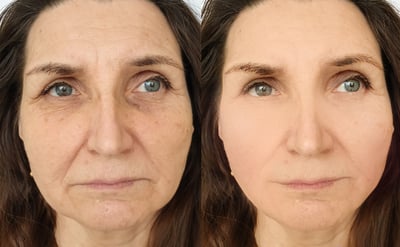
Your skin is your largest organ and it’s also a reflection of your overall health. Your nutrition affects the health of your skin, which means you literally are what you eat. Vitamin deficiencies and skin conditions go hand-in-hand.
Ensure that you are getting enough of the following nutrients and your skin will glow:
Vitamin C
Vitamin C is very good for your skin. Not only does it help maintain overall health, it helps produce collagen – the structural protein that keeps your skin looking firm and young. It prevents you from developing scurvy – a condition associated with skin lesions and pirates. Good sources of Vitamin C include citrus fruit (oranges, grapefruit, etc.), bell peppers (red, green, yellow), strawberries, kale, and brussel sprouts.
Vitamin E
Together with Vitamin C, Vitamin E is particularly important when it comes to reducing sun damage. Fair-skinned individuals benefit most from the addition of Vitamins C and E to their diets in conjunction with regular use of sunscreen. Good sources of Vitamin E include leafy greens (spinach, kale, etc.), nuts (almonds, hazelnuts, pistachios), avocados, shellfish and fatty fish, and plant oils.
Vitamin D
Your epidermis–the outermost layer of your skin–uses sunlight to synthesize Vitamin D. One of the many benefits of Vitamin D is its ability to protect and repair UV damage–a major cause of skin cancer. “As a dermatologist, I don’t recommend exposing your skin to undue rays just to up your Vitamin D levels,” says Betsy Wernli, MD, a board-certified dermatologist with Forefront Dermatology. “Not only can it lead to skin cancer–including squamous cell and basal cell carcinoma as well as the potentially deadly melanoma–it can also have cosmetic effects like wrinkles and premature aging. If you’re deficient in Vitamin D, seek out other sources like Vitamin D-rich foods or plain old supplements.” Good sources of Vitamin D include high-fat fish (trout, salmon, swordfish, etc.), mushrooms, tofu, and dairy products.
Your Local Skin Experts at Forefront Dermatology are Here to Help
Establishing a relationship with a board-certified dermatologist is an important step you should take to keep your skin healthy, especially if you suffer from an itchy, painful, or irritating skin condition. If you or a family member have a skin concern, have questions about nutrition, or would like to schedule a consult, find the Forefront dermatologist nearest you to schedule an appointment or to learn more.





